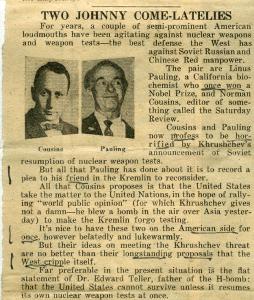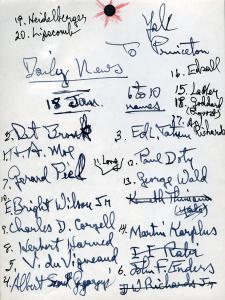
New York Daily News opinion piece of September 2, 1961.
[Part 1 of 2]
As readers of this blog know, Linus Pauling was a prominent public figure who became especially well-known for his campaign against nuclear bomb testing. The “Appeal by American Scientists to the Governments and Peoples of the World,” circulated by Pauling and his wife in 1957 and 1958, garnered the signatures of over 11,000 scientists from around the world, each of them condemning the detonation of nuclear weapons in the atmosphere. The petition received a great deal of attention and ultimately led to Pauling’s receipt of the Nobel Peace Prize in 1963.
The petition also came about in the midst of the Cold War, and Pauling’s protests made many Americans uncomfortable and even angry. Much of the public saw his efforts to work with communist countries as evidence of communist sympathies and, by extension, betrayal of the United States. Many newspaper editors around the country took a similarly dim view and attacked Pauling in print for his actions. Naturally, Pauling worried about the impact that articles of this sort might make on his reputation, and he chose to fight back against numerous media sources through libel lawsuits.
On September 2, 1961, the New York Daily News published an editorial titled “Two Johnny Come-Latelies” that criticized Pauling’s anti-testing activism and mocked him for his efforts in light of the resumption of bomb testing in the Soviet Union. The piece suggested that
For years, a couple of semi-prominent American loudmouths have been agitating against nuclear weapons and weapon tests – the best defense the West has against Soviet Russian and Chinese Red manpower. [Norman] Cousins and Pauling now profess to be horrified by Khrushchev’s announcement of Soviet resumption of nuclear weapon tests…But all that Pauling has done about it is to record a plea to his friend in the Kremlin to reconsider…It’s nice to have these two on the American side for once, however belatedly and lukewarmly. But their ideas on meeting the Khrushchev threat are no better than their longstanding proposals that the West cripple itself.
Reader Louis B. Settner wrote to Pauling informing him of the opinion piece and likewise wrote a letter to the editors of the Daily News that defended Pauling and objected to the editorial’s tone. The Daily News refused to publish Settner’s letter, but the protestations to the piece were far from over.
In October, Pauling responded to Settner, writing that the actions of the editors
are shocking, and of course it is shocking that the Daily News would not publish your letter. The captive press in the United States is a great danger to civilization. I am pleased to tell you that I probably shall institute suit for libel against the Daily News, on the basis of the defamatory editorial.
Francis Hoague, Pauling’s Seattle-based lawyer in a concurrent libel lawsuit filed against the Bellingham, [Washington] Herald, offered to take on the case for a fee of one-third of any settlement reached out of court or for half of a settlement arrived at in court. Hoague had already taken care of most of the preparation required for the Bellingham case, which was filed in response to editorials published in late November and early December 1960, and likely saw himself as a natural fit for this new complaint.
The case against the Bellingham paper, one of Pauling’s first lawsuits, was instigated in early 1961 and proceeded with relative rapidity. The dispute reached a settlement out of court in April 1962 with Pauling agreeing to damages of $16,000 plus a retraction. As it turned out, this was one of only two libel lawsuits, out of eight filed in total, that ended in Pauling’s favor.

List of East Coast-based character witnesses supplied by Pauling to his lawyer, Francis Hoague.
Throughout 1962, Pauling’s team worked gather information and depose witnesses. As had been the arrangement in Bellingham, Francis Hoague worked on the Daily News case in collaboration with another more experienced lawyer, J.P. Tonkoff, though Pauling’s contract was technically with Hoague alone, and not Tonkoff.
Hoague and Tonkoff had worked well together on the Bellingham case, but they became very frustrated with each other as work on the Daily News complaint moved forward. Over time, Tonkoff came to believe that Hoague was incompetent as a litigation lawyer and expressed a wish that he were in charge of the suit, rather than Hoague.
In February 1963, the Daily News suffered a damaging blow in the form of a $201,000 verdict against the paper for having libeled a different plaintiff. This particular suit was filed by Paul J. Kern, a project manager for the New York City Housing Authority, whom the Daily News had declared to be a communist. Eleanor J. Piel, Kern’s high-profile lawyer, was a key player in the success of Kern’s suit.
Pauling’s complaint first came to trial in May 1963. Pauling’s chief counsel, Francis Hoague, included in his tactics a large number of character witnesses who spoke positively of Pauling’s character, and ultimately this strategy backfired. One of the character witnesses, chemist (and future Nobel laureate) Martin Karplus, spoke of the trial and the verdict in a 2013 oral history interview conducted by the Oregon State University Libraries.
…it was in New York, the trial, and so I went down and did testify for him, as did various other people. And then, as I remember it, he actually lost the case because the judge felt, ‘look, if you’re going to have all these people testifying for you, a libel suit really doesn’t make any sense’…and the judge said this, I remember, was that he had all these sterling witnesses, so he wasn’t harmed by what they [the Daily News] wrote.
At the end of May, Pauling met with Francis Hoague, to inform him that he would be appealing the decision and that Eleanor Piel was going to take over the Daily News case. As Pauling documented in a note to himself
I mentioned that I thought that Mrs. Piel, with her experience and knowledge of the New York courts and the opposing lawyer, could do a better job than Mr. Hoague himself. I pointed out that I felt that he was not tough enough for Mr. Carter and the New York courts.
As we’ll see next week, the situation became rather strange at this point.
